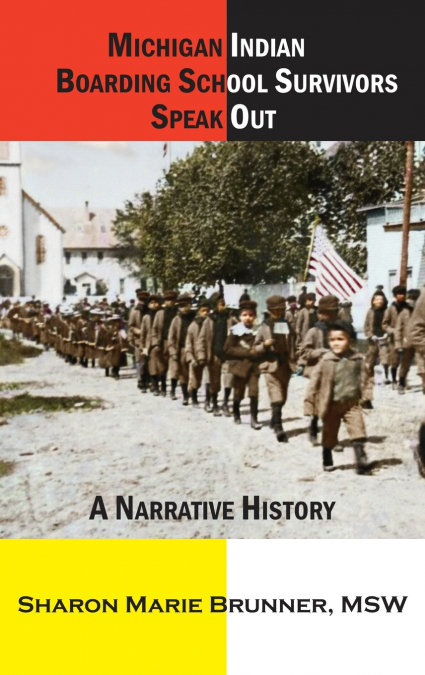
 Librería Perelló (Valencia)
Librería Perelló (Valencia)
 Librería Aciertas (Toledo)
Librería Aciertas (Toledo)
 El AlmaZen del Alquimista (Sevilla)
El AlmaZen del Alquimista (Sevilla)
 Librería Elías (Asturias)
Librería Elías (Asturias)
 Librería Kolima (Madrid)
Librería Kolima (Madrid)
 Donde los libros
Donde los libros
 Librería Proteo (Málaga)
Librería Proteo (Málaga)
The impact of Indian boarding schools has been devastating for generations of Native Americans, and the aftershocks continue to affect their descendants today. Michigan was home to three: in Baraga, Harbor Springs and Mt. Pleasant. The last to close was Holy Childhood School of Jesus, in Harbor Springs, in 1983. Sharon Marie Brunner set out to intensively study the family history and boarding school experience of nine Native American survivors who attended either the Mt. Pleasant or Harbor Springs institutions. Each faced problems linked to the scars of this experience, although their recollections included positive and negative reports. A woman whose mother attended one of these institutions, and a member of the Sault Ste Marie Tribe of Chippewa Indians, Brunner is uniquely positioned to understand the cultural background.Brunner deftly teases out the themes from in-person interviews transcribed in 2001. Surprising similarities and differences are explored in this highly researched social work treatise. Abuses are documented in the hope that we can prevent such a calamity from ever happening again. Whether or not you have any Native American heritage, this book is crucial to understanding the lived experience of our fellow human beings and how we can do better. Social workers, educators and those in human services must read this book to develop policies that address the unique challenges and strengths of Native American people.'Sharon Marie Brunner, an enrolled member of the Sault Ste. Marie [Michigan] Tribe of Chippewa Indians, combines her family and tribal experiences with historical research to provide a unique and strong foundation for this narrative history. Based on interviews with Northern Michigan Native people who had lived in an Indian Boarding School or whose parents had lived in a Boarding School, This book includes the interviews Brunner conducted as well as her meticulous analysis of the resulting data, which enabled her to delineate the social, personal, and spiritual effects of this government enforced separation of children from their families, and of the lasting negative impact that resulted from the denigration of the children’s Native heritage and cultural mores. I highly recommend this book.' -- Sue Harrison, international bestselling author of The Midwife’s Touch'Sharon Brunner provides a thoroughly researched, thoughtfully presented discussion of one of the dark sins of America: Indian Boarding Schools. The interviews with nine Northern Michigan residents, recounting their times in these schools and how the rest of their lives were affected, are deeply moving.' -Jon C. Stott, author, Native Americans in Children’s Literature'Sharon Brunner is a prolific writer who uses her Native American roots to craft stories that speak of the trauma Indigenous people experienced as a result of being forced to live in Christian boarding schools. Children were taken from their families, their culture and their roots. Brunner’s true stories are written with a passion that flows from deep within her.' -Sharon Kennedy, EUP News'Sharon Brunner’s Michigan Indian Boarding School Survivors Speak Out is meticulously researched and a recommended read for the serious student of Native American history. The author focuses on the accounts of nine former boarding school residents and the effects their experiences had on their lives and the lives of their descendants. Especially appreciated is the author’s detailed background presentation against which she weaves these personal narratives. Reading this book is helping me as I research my grandfather’s story.' -Ann Dallman, freelance journalist and author of the award-winning Cady Whirlwind Thunder mystery series.